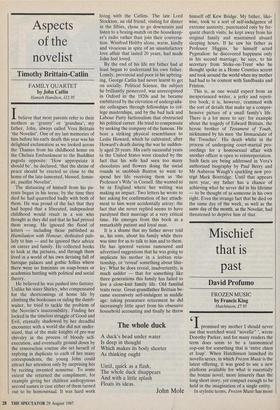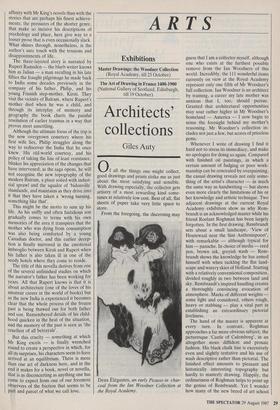Mischief that is past
David Profumo
FROZEN MUSIC by Francis King Hutchinson, f7.95 41 promised my mother I should never use that wretched word "novella" ', wrote Dorothy Parker, and for many readers the term does seem to be a taxonomical cop-out for something that is 'entre chien et loup'. When Hutchinson launched its novella series, in which Frozen Music is the latest offering, it was good to see a new platform available for what is essentially the bonzai novel, more leisurely than the long short story, yet compact enough to be held in the imagination of a single entity.
In stylistic terms, Frozen Music has more affinity with Mr King's novels than with the stories that are perhaps his finest achieve- ments; the pressures of the shorter genre, that make so incisive his descriptions of psychology and place, here give way to a looser prose that is even occasionally slack. What shines through, nonetheless, is the author's sure touch with the tensions and disappointments of life.
The three-layered story is narrated by Rupert Ramsden — the blurb writer knows him as Julian — a man recalling in his late fifties the fraught pilgrimage he made back to India some decades previously in the company of his father, Philip, and his young Finnish step-mother, Kirsti. They visit the vicinity of Balram, where Rupert's mother died when he was a child, and through its interplay of memory and geography the book charts the painful resolution of earlier traumas in a way that proves most unsettling.
Although the ultimate focus of the trip is the now overgrown cemetery where his first wife lies, Philip struggles along the way to rediscover the India that he once knew. His old-world courtesy, and his policy of taking the line of least resistance, blinker his appreciation of the changes that have intervened; as the saga opens, he will not recognise the new topography of the modern Balram, a place soiled with indust- rial sprawl and the squalor of tidonville' slumlands, and maintains as they drive into it that they have taken a 'wrong turning, something like that'.
This might be the motto to sum up his life. As his sniffy and often fastidious son gradually comes to terms with his own memories of the area it transpires that the mother who was dying from consumption was also being comforted by a young Canadian doctor, and this earlier decep- tion is finally mirrored in the emotional imbroglio between Kirsti and Rupert when his father is also taken ill in one of the seedy hotels where they come to reside.
The title of this novella derives from one of the several unfinished studies on which the narrator's father has been working for years. All that Rupert knows is that it is about architecture (one of the loves of his amateur career in the world of books) but as the new India is experienced it becomes clear that the whole process of the frozen past is being thawed out for both father and son. Remembered details of his child- hood quicken in the heat of the situation, and the memory of the past is seen as 'the cruellest of all betrayals'.
But this cruelty — something at which Mr King excels — is finally wrenched round to create a perspective in which, for all its surprises, his characters seem to have arrived at an equilibrium. There is more i than one act of darkness here, and in the end it makes for a book, novel or novella, that is as disconcerting as anything one has come to expect from one of our foremost observers of the friction that seems to be part and parcel of what we call love.











































 Previous page
Previous page